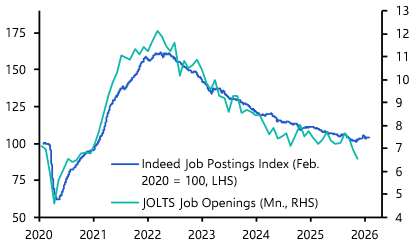The past week has brought the first evidence of the economic damage caused by the coronavirus. The numbers are stark. Passenger traffic in China is down by around 60% compared to the same period around the Lunar New Year holiday last year. Property sales have collapsed. And energy consumption has failed to rebound following its usual drop over the holiday period. There are also signs that the disruption is starting to spread to neighbouring economies through supply chains. Imports to Korea from China during the first ten days of this month fell by nearly 50% y/y. That’s the biggest fall since Asia's financial crisis in 1999 and is larger than the drop experienced at the height of the global financial crisis in 2008-09. (You can track all this data on a dedicated coronavirus page on our website.)
The spread of the virus has created a cottage industry for economic forecasters. It is now all but certain that China’s economy will contract in quarter-on-quarter terms in Q1. We have pencilled in a fall in output of 2.5% q/q (-10% annualised) on our CAP measure in the first quarter. The more important question, however, is how quickly any lost output can be made up.
If workplaces reopen soon, we think activity should rebound relatively quickly with lost output recovered over the rest of this year. But a prolonged shutdown could mean lost output is never recovered. It would also increase the likelihood that the virus triggers a “black swan” type event either in China (keep one eye on the property market) or further afield (keep one eye on the energy sector).
Last week we published two major pieces of research assessing the economic consequences of the outbreak for China and the rest of the emerging world. (If you would like access to either report, drop me an email.) However, it’s also worth casting our eye beyond the next year or so and considering whether the virus will have longer-term repercussions. One plausible consequence is that it could accelerate the process of deglobalisation that is already spreading through the world economy and which we have previously warned about.
One catalyst for this could be a political shift in China itself. Some commentators have speculated that, since the virus has undermined the popular belief that concentrating power in the Party is the best way forward for China, the Party may start to liberalise and relinquish control. This could, in time, push China and the West closer together. But it’s equally possible that, once the virus is brought under control, popular feeling may start to shift again. Beijing may be able to make the case that the outbreak was only contained thanks to a strong centre. And if that happens, it could entrench China’s existing economic model and make further clashes with the US more likely in the future.
In truth, people are often too quick to jump on the idea of impending political change in China. A more immediate way in which the crisis could accelerate a process of de-globalisation is by adding to a growing pushback against large and complex supply chains. Up to now, the threat to supply chains has been viewed mainly through the prism of policy and technology. The US-China trade war, alongside Brexit, undermined the previous belief that free trade was an immutable pillar of the world economy. At the same time, new technologies such as 3D printing have enabled the re-shoring of some aspects of manufacturing production that were previously offshored to emerging economies. Both factors seem likely, in our view, to cause an increasing number of firms to question the benefits of maintaining large supply chains.
The coronavirus outbreak has highlighted another vulnerability in global supply chains. Many firms are now warning about an impending shortage of component parts caused by factory closures in China. Some have already announced production suspensions as a result. More will inevitably follow if the closures in China continue. It’s difficult to judge how the economic effects of the virus will play out over the next ten days, let alone the next ten years. But it’s possible that, to policy and technology, we may soon have to add the threat of global pandemics (and indeed natural disasters more generally) to the list of factors threatening the future of globalisation.
In case you missed it:
- Our Senior EM Economist, Jason Tuvey, sketches out what an IMF programme for Lebanon might look like – and explain why large haircuts and a big devaluation are likely.
- Our Senior Property Economist, Kiran Raichura, looks at debt cycles in US commercial real estate markets and asks whether problems are brewing.
- Our Senior UK Economist, Ruth Gregory, picks through the tumult of last week’s cabinet reshuffle and argues a bigger fiscal relaxation is now on the horizon.



